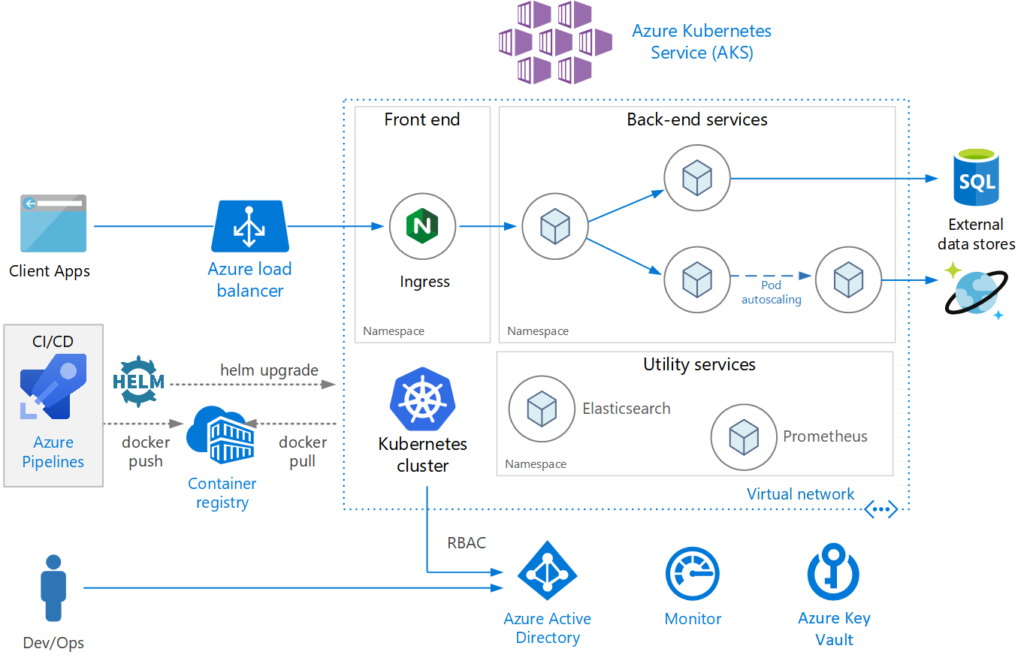Introduction
Cloud computing and Azure have become essential for businesses of all sizes, enabling them to access computing resources on-demand, scale as needed, and pay only for what they use. Azure, offered by Microsoft, is one of the leading cloud computing platforms worldwide, providing a comprehensive set of services, from computing to machine learning, with a global presence of data centers. Cloud computing also allows businesses to improve collaboration, productivity, agility, and cost reduction. With a wide range of customers, Azure serves small startups to large enterprises.
Microsoft Cloud Computing – Azure
Microsoft Azure is a cloud computing platform that offers a variety of services and tools for creating, deploying, and managing applications and infrastructure in the cloud. It enables users to access computing resources on-demand, scale up or down as needed, and pay only for what they use. Azure provides a wide range of services, including computing, storage, networking, databases, artificial intelligence (AI), machine learning, and more, with a global presence of data centers. As one of the leading cloud computing platforms in the world, Azure has a wide range of customers, from small startups to large enterprises, and continues to innovate and expand its offerings.
Cloud Services provided by Azure:
Azure provides a wide range of cloud services to businesses, organizations, and individuals looking to develop, deploy, and manage applications and infrastructure in the cloud. These services include:
- Compute: Azure provides a range of computing options, such as virtual machines, container instances, and serverless computing options like Azure Functions.
- Storage: Azure offers a variety of storage choices, including blob storage, file storage, and disk storage for virtual machines.
- Networking: Azure provides virtual networking solutions that allow businesses to connect and secure their resources, as well as other networking services like load balancing and content delivery.
- Databases: Azure offers managed database services for SQL, NoSQL, and in-memory databases, as well as tools for data migration and integration.
- AI and Machine Learning: Azure has a variety of tools and services for machine learning, natural language processing, and computer vision.
- DevOps: Azure provides DevOps tools and services like continuous integration/continuous delivery (CI/CD), source control, tracking, and logging.
- Internet of Things (IoT): Azure provides services for IoT, including device management, messaging, and analytics.
- Security and Identity: Azure provides threat detection and tracking, as well as identity and access management services.
- Analytics: Azure offers various analytics services, such as data warehousing, big data analytics, and real-time analytics.
These services provide businesses with the flexibility, scalability, and reliability they need to build and deploy applications in the cloud, and the ability to scale resources quickly and easily up or down as needed.
Microsoft cloud Azure – Benefits:
- Scalability: Azure’s cloud computing resources can be easily scaled up or down to meet fluctuating demands, allowing companies to optimize resource utilization and reduce costs.
- Cost Savings: Azure’s pay-as-you-go pricing model enables businesses to only pay for the resources they use, lowering upfront expenses associated with purchasing and maintaining physical infrastructure.
- Global Reach: Businesses can deploy their apps and services closer to their users with Azure’s worldwide network of data centers, which lowers latency and boosts performance.
- Security: Azure offers advanced security features to help protect against cyber threats and data breaches, providing businesses with peace. of mind
- Comprehensive Services: Azure offers a comprehensive suite of cloud computing services, including networking, analytics, storage, processing, and more, letting companies pick the ones that best suit their needs.
- Integration: Azure offers seamless integration with other Microsoft services, such as Office 365 and Dynamics 365, making it easy for businesses to integrate their workflows and processes.
- Innovation: Azure is constantly updating and expanding its services, providing businesses with access to the latest innovations in cloud computing.
By leveraging these benefits, businesses can achieve greater efficiency, cost savings, and performance when using Azure for cloud computing.
Cloud Computing Trends and Azure's Solutions
Cloud computing is growing fast and multi-cloud strategies and serverless computing are major trends. Azure offers hybrid and multi-cloud solutions, serverless computing with Azure Functions, and a range of tools for DevOps and data analytics. Here are the current cloud computing trends and Azure’s response to them:
- Hybrid and multi-cloud solutions: Businesses are increasingly embracing hybrid and multi-cloud solutions to reap the benefits of both public and private cloud environments. Azure provides hybrid cloud options that integrate on-premises infrastructure and Azure seamlessly.
- Edge computing: Edge computing is a distributed computing paradigm that brings computation and data storage closer to the location where it is needed. Azure provides a variety of edge computing options, such as Azure IoT Edge and Azure Stack Edge, that allow businesses to process data closer to the source.
- Serverless computing: This approach lets the cloud provider take care of infrastructure management and resource allocation automatically. Businesses can create and operate event-driven applications using Azure Functions, a serverless computing platform, without having to worry about infrastructure.
- Containerization and Kubernetes: Containers and Kubernetes have become the standard for deploying and managing cloud applications. Azure provides a number of containerization solutions, such as Azure Kubernetes Service (AKS), which makes managing containers at scale simple and effective.
- DevOps and CI/CD pipelines: DevOps practices and CI/CD pipelines are critical for businesses to deliver software faster and with higher quality. Azure provides a range of tools, including Azure DevOps and Azure Pipelines, that enable businesses to implement DevOps practices and CI/CD pipelines.
- Data analytics and visualization: For businesses to make data-driven choices, data analytics, and visualization are becoming more and more crucial. Businesses can store, evaluate, and visualize data at scale using a variety of Azure services, such as Azure Data Lake Analytics and Power BI.
Azure responds to these trends by providing a comprehensive set of services and tools that enable businesses to take advantage of the latest innovations in cloud computing. By embracing these trends, businesses can stay ahead of the competition and drive growth and innovation.
Modernization of Azure Technology:
The process of updating or upgrading existing Azure technologies to newer versions or adopting new technologies to optimize performance, enhance security, and improve user experience is referred to as the modernization of Azure technology. Modernization entails migrating applications and infrastructure to Azure, adopting cloud-native approaches, and developing and deploying applications using modern tools and frameworks. Implementing DevOps practices and using data analytics and artificial intelligence to drive business outcomes are also part of it. Modernization of Azure technology enables businesses to stay competitive, reduce costs, and improve agility in an ever-changing digital landscape.
The Future of Cloud Computing with Azure:
The future of cloud computing with Azure is promising as businesses continue to leverage the benefits of cloud technology for their operations. As Azure continues to evolve and innovate, it is important to keep up with the latest trends and developments to stay competitive. The essential factors to think about while imagining the future of cloud computing with Azure are outlined here:
- Continued growth of hybrid and multi-cloud solutions
- Increased adoption of edge computing for real-time processing and analysis
- Greater focus on security and compliance in cloud environments
- Advancements in containerization and Kubernetes for easier application management
- Increased automation and integration with DevOps and CI/CD pipelines
- Continued expansion of AI and machine learning capabilities for improved decision-making
- More emphasis on data analytics and visualization for insights and competitive advantage
- Continued investment in sustainability and reducing the environmental impact of cloud computing.
Get started with Al Rafay Consulting.
Al Rafay Consulting, a top cloud service provider, specializes in assisting companies of all sizes and sectors to use the power of cloud computing to streamline operations, increase productivity, and drive growth. From cloud strategy and implementation to managed services and support, we have the expertise and resources to deliver customized solutions that meet your unique needs. Ready to take your business to new heights? Let’s start by getting in touch with us today!

5- Microsoft Azure Marketplace for Developers
With the Azure ecosystem, you will find all kinds of solutions to aid your development efforts and create dynamic apps more rapidly and effectively. Then it might assist you in connecting your product to customers worldwide.
You can find ready-to-use configurations of a wide range of products in the Azure Marketplace, including Windows Server, Octopus Deploy, Oracle Databases, WordPress instances, and Minecraft servers. You only need to select a solution, customize it, deploy it, and start using it. Products and services from Microsoft and Microsoft Partners are widely available on the Marketplace. There are also numerous open-source options available. The Marketplace’s convenience of usage is a benefit. All necessary components and solutions are deployed in a ready-to-use state. It may also be a license you bring yourself, a virtual machine with installed software, or a virtual network setup and a license loaded.
This is sometimes a service you purchase, like a Bing Maps API for an Enterprise subscription. Enterprise-level solutions and new software can be simply tested using the Marketplace. You can certainly find a solution on the Marketplace for any requirement.
Get Technical Assistance from Microsoft Azure Development Experts
Get started with Microsoft Azure development best practices by the experienced Azure developers at Al Rafay Consulting. We have a team of certified Microsoft experts who are highly experienced in developing cloud-native Azure solutions and large-scale enterprise applications.


